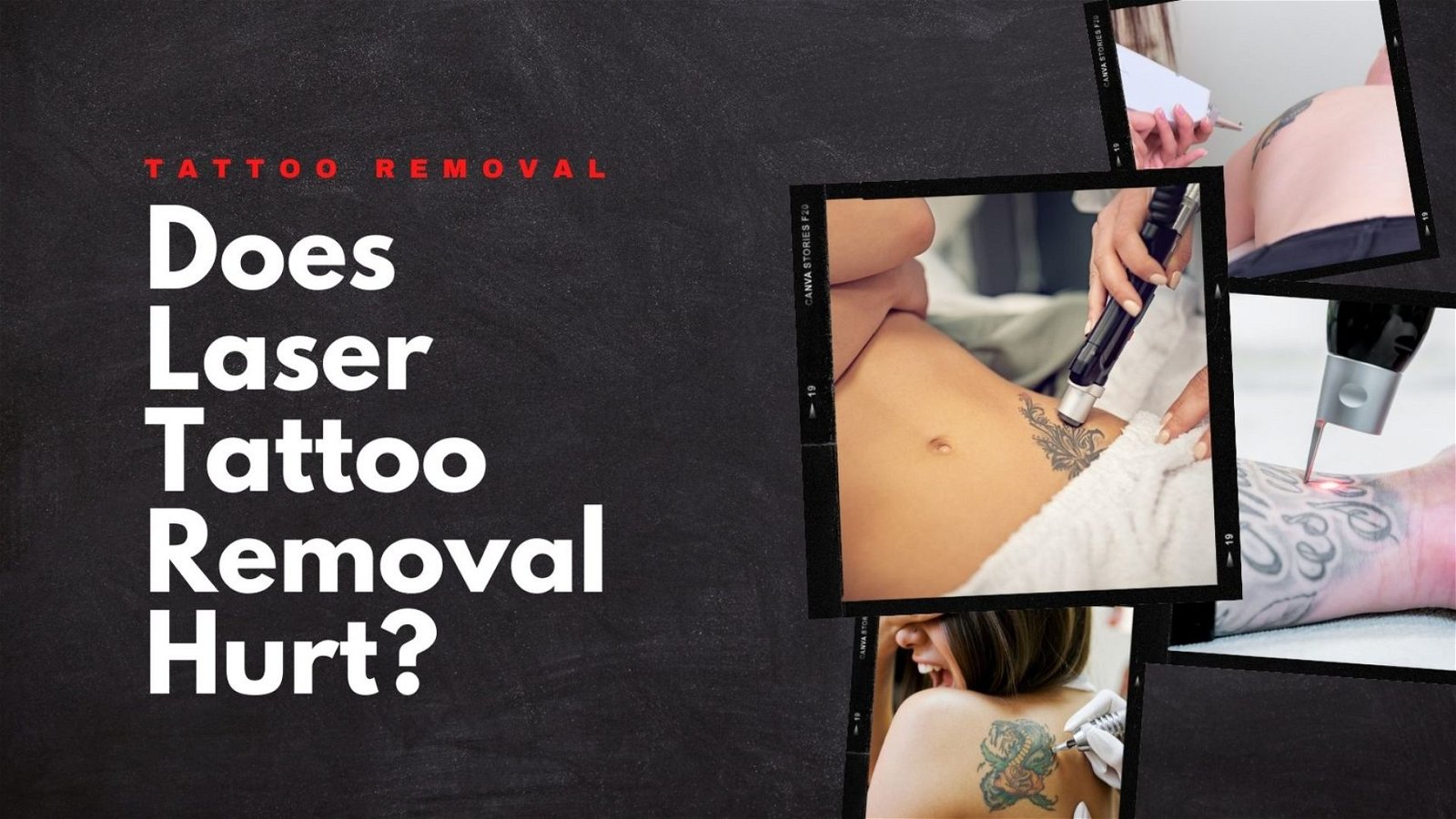Laser tattoo removal is one of the big 4 methods to remove tattoos that you may not be too fond of anymore. Maybe you regret the tattoo or maybe you want to make space for a new tattoo design?
You’ve probably heard about laser tattoo removal, but did you know that each tattoo can take multiple sessions which runs costs up into the thousands?
Learn more about the laser tattoo removal process and find out if the pain is really worth it.
What Is Laser Tattoo Removal?
Laser tattoo removal is a procedure that uses a laser to break up ink pigments in a tattoo.
The laser pulses a high-intensity light beam at the tattoo, causing the ink to break up into smaller pieces.
These pieces are then absorbed by the body and eliminated.
Types of Laser Used in Tattoo Removal
There are three types of lasers used in tattoo removal:
- Q-switched ruby laser (694 nm)
- Q-switched Nd: YAG laser (532 nm, 1064 nm)
- Q-switched alexandrite laser (755 nm).
The Q-switched ruby and alexandrite laser are the best lasers for removing black, blue, and green tattoo pigments.
The wavelength of these lasers is well absorbed by melanin, causing hyperpigmentation. So people with darker skin tones should avoid these lasers.
The Q-switched Nd: YAG laser is the best laser for removing red, orange, purple, and yellow tattoo pigments.
The wavelength of this laser has minimal effect on the epidermis and melanocytes, decreasing the chance of blistering and hypopigmentation. This is the safest laser for all Fitzpatrick skin types.
And because each laser contains different wavelengths, one laser system cannot remove multicoloured tattoos.
Newer research focuses on picosecond lasers which may be more effective in removing new vibrant tattoo inks.
To find out what type of laser is best to remove your tattoo, consult a dermatologist or a tattoo removal specialist.
How Much Does Laser Tattoo Removal Cost?
The cost of laser tattoo removal varies depending on factors such as the size of the tattoo and the location of the tattoo. Learn more about other tattoo removal costs.
For larger tattoos, the cost can be around $500 per session. For smaller ones, it can be around $100 or $200 per session.
Most tattoos take 6 to 7 sessions to complete remove, depending on the size and location.
For face tattoos, the cost can be higher, around $1,000 per session. The cost for face tattoo removal is often more expensive because it is a more sensitive area and can cause more scarring.
What Is The Pain Factor?
The pain factor is often a concern for people considering laser tattoo removal.
Q-switched lasers are known to be painful. That’s why experts use lidocaine injections or topical anaesthesia cream before the procedure.
This will help minimize the pain, making it more tolerable.
However, the pain varies depending on the person. Some people find the procedure very painful, while others find it to be more tolerable.
It is often described as being similar to getting a sunburn.
Factors Affecting Laser Tattoo Removal
There are certain factors that can affect the laser tattoo removal process and result. These include:
Location
The location of the tattoo on the body can affect how easily it is to remove with a laser. Tattoos closer to the surface of the skin, such as those on the tattoo sleeves or leg tattoos, are generally easier to remove than those deeper, such as those on the chest or back.
Age
The age of the tattoo can also affect how easily it is to remove. Older tattoos are generally easier to remove than newer ones, as the ink has more time to settle into the skin.
Color
The colour of the tattoo can also affect how easily it is to remove. Darker colours, such as black or blue, are generally easier to remove than lighter colours, such as red or yellow.
Skin Type
The type of skin can also affect how easily a tattoo is removed. People with darker skin tones generally have tattoos that are harder to remove than those with lighter skin tones.
This is because people with darker skin tones tend to have increased melanin, which is well absorbed by the laser, causing hypopigmentation.
To check your skin type, you can refer to the Fitzpatrick scale.
Tattoo Size
The size of the tattoo can also affect how easily it is to remove. Larger tattoos are generally harder to remove than smaller tattoos. This is because large tattoos have a larger surface area and therefore require more laser energy to break up the ink.
Types of Tattoos
There are 5 types of tattoos—some of those or easier to remove than others.
Amateur Tattoo
An amateur tattoo is a tattoo that is done by an unskilled person. Amateur tattoos are generally the easiest to remove, as they often contain less ink and are not as deeply embedded in the skin.
Professional Tattoo
A professional tattoo is a tattoo that is done by a skilled artist. Professional tattoos are generally harder to remove than amateur tattoos, as they often contain more ink and are deeply embedded in the skin.
Cosmetic Tattoos
Cosmetic tattoos are tattoos that are used to enhance the appearance of the skin. Cosmetic tattoos are generally the hardest to remove due to the location of the tattoo-like your eyebrows or lips.
Medicinal Tattoos
Medicinal tattoos are tattoos that are used to provide medical information about the person, such as their blood type, allergies, and medical conditions like epilepsy. Medicinal tattoos can either be easy or hard to remove, depending on the tattoo artist.
Traumatic Tattoos
Traumatic tattoos are tattoos resulting from a traumatic event, such as an accident or injury. Traumatic tattoos can be removed with a laser after a couple of sessions.
Risks Associated With Laser Tattoo Removal
Risks accompany any procedure, and laser tattoo removal is no exception.
Some of the risks associated with laser tattoo removal include:
Skin irritation
Skin irritation is a risk that accompanies any procedure, and laser tattoo removal is no exception.
Skin irritation during laser tattoo removal can be caused by various factors such as the type of laser used, the patient’s skin type, and the intensity of the laser.
The risk of skin irritation can be minimized by using a lower intensity laser and by using the appropriate type of laser for the patient’s skin type.
Burns
Burns are also a risk with laser tattoo removal.
They can be caused by the heat that is produced when the laser breaks up the ink.
Burns can cause scarring. To minimize the risk of burns, it is important to use a low-intensity laser and avoid contact with the skin.
Scars
Scars are a risk with any type of surgery, and laser tattoo removal is no exception.
Scars can be caused by the surgical procedure itself or by the laser. This is the most common side effect of using Q-switched ruby lasers.
To minimize the risk of scars, it is important to use a laser suitable for your skin type and avoid touching the skin after treatment.
Skin Discoloration
Skin discolouration is also a risk with laser tattoo removal.
It can be caused by the heat of the laser or by the ink that is broken up by the laser.
Skin discolouration is usually temporary, but it can sometimes be permanent.
Transient hypopigmentation is seen at least 50% in patients treated with Q-switched alexandrite laser.
To minimize the risk of skin discolouration, avoid exposing the area to the sun after treatment. Better yet, apply sunblock before going out.
Infection
Infection is a rare but serious risk with laser.
This can be due to the use of an unsterile laser or from the injection of lidocaine.
To minimize the risk of infection, it is important to use a sterile laser and to make sure that the area is clean before treatment.
Also, it is important to follow the post-operative instructions carefully.
Conclusion
So, does laser tattoo removal hurt? The answer is yes. But with lidocaine and topical anaesthetic cream, pain can be tolerable.
Also, using a low-intensity laser and the appropriate type of laser for the patient’s skin type can minimize the risk of severe dermal damage.
Finally, following the post-operative instructions carefully can reduce the risk of infection. So, if you’re considering laser tattoo removal, be sure to discuss these risks with your doctor.
Sources:
- Types of Laser
https://pubmed.ncbi.nlm.nih.gov/11702617/#:~:text=Three%20types%20of%20lasers%20are,black%2C%20blue%20and%20green%20pigments.
- Lidocaine Injections
https://my.clevelandclinic.org/health/drugs/19854-lidocaine-skin-cream-or-ointment#:~:text=LIDOCAINE%20(LYE%20doe%20kane)%20is,burns%2C%20scrapes%20and%20insect%20bites.
- Fitzpatrick Scale
https://jamanetwork.com/journals/jamadermatology/fullarticle/1737180
- Transient Hypopigmentation
https://www.ncbi.nlm.nih.gov/books/NBK442007/figure/article-29882.image.f1/





